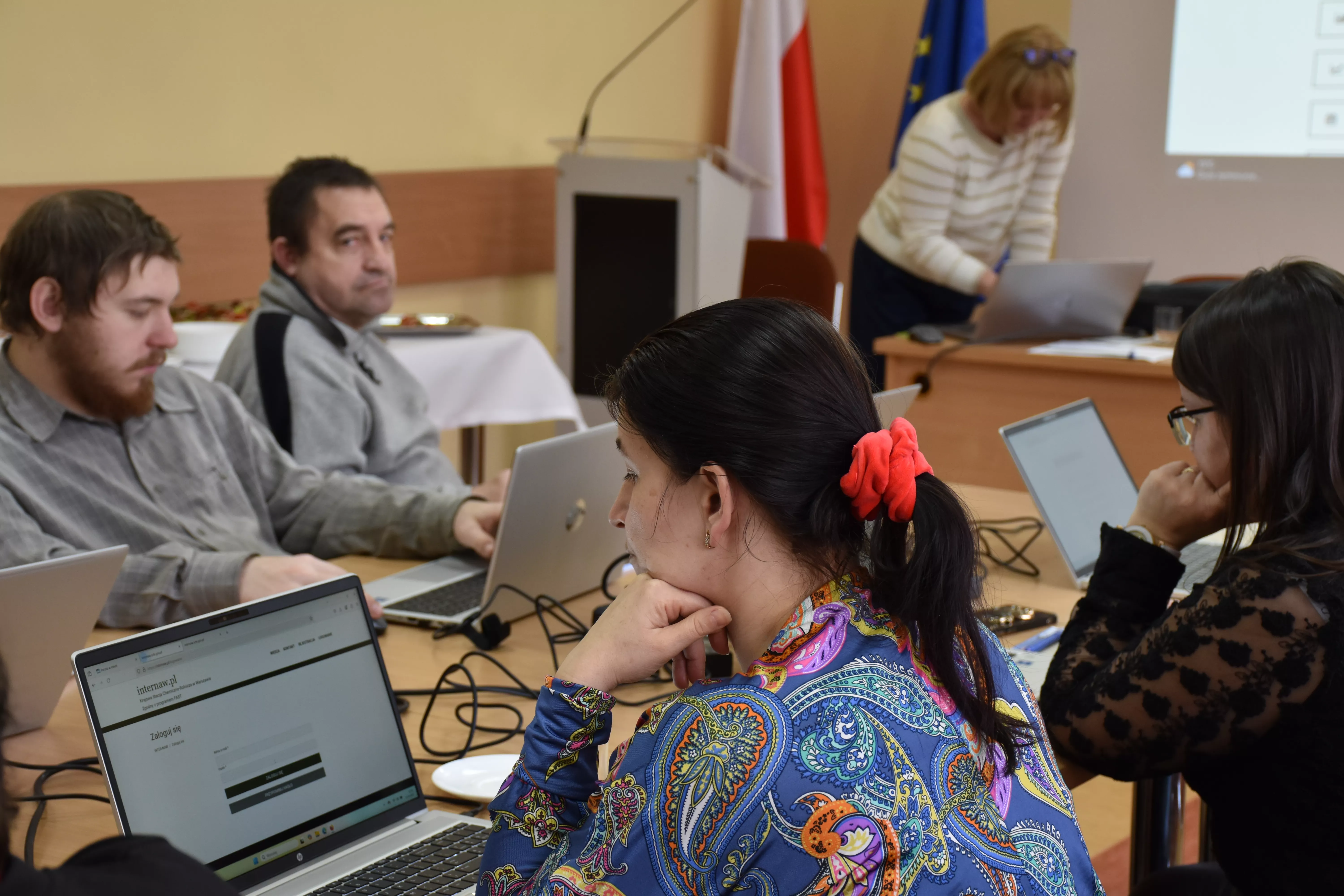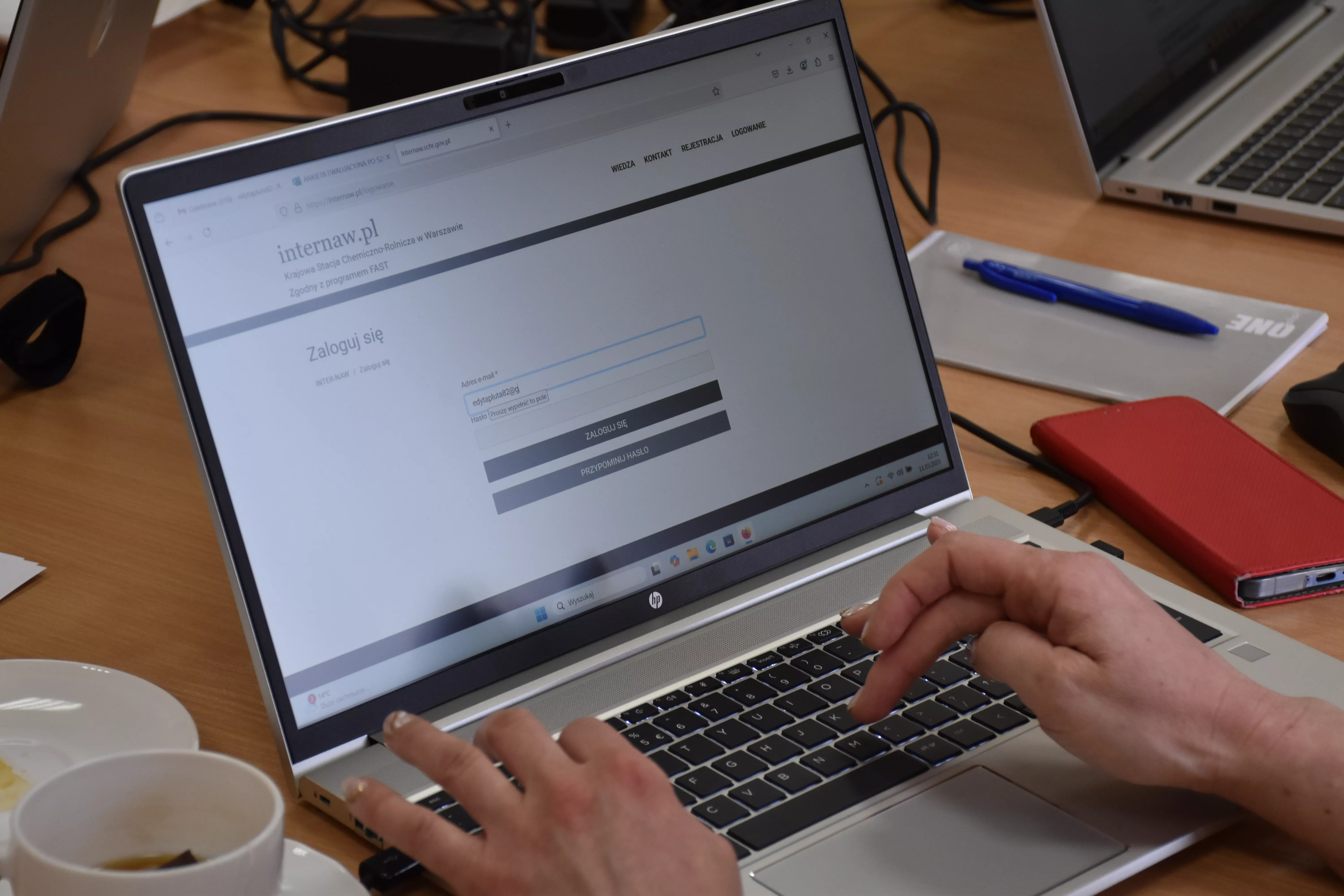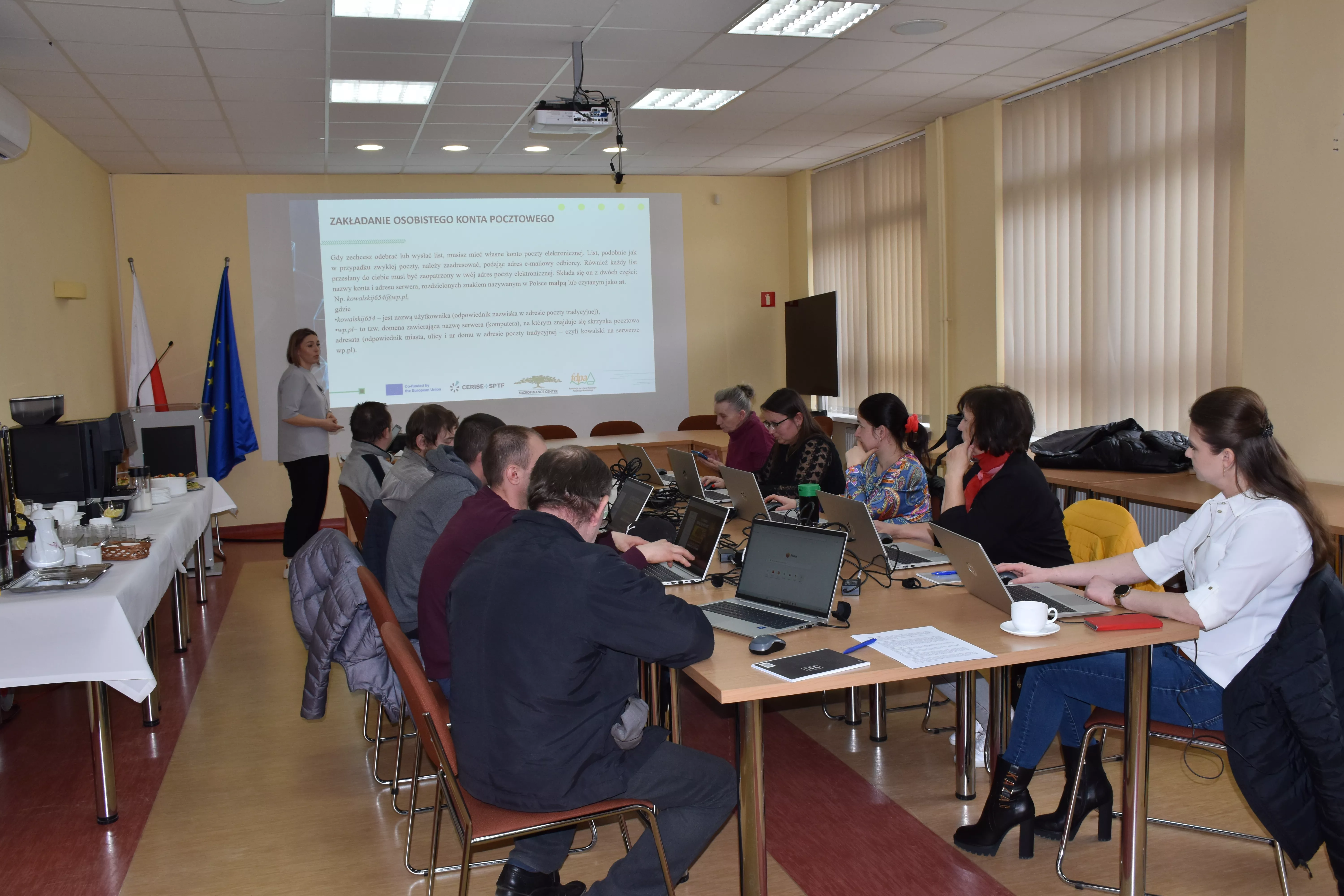![]()
Title: Digitalisation as an opportunity to increase the efficiency of enterprises in rural areas.
Project budget: EUR 55 550
Project duration: February 2024 - April 2025
The project is implemented within the framework of the TRANSFORM TOGETHER FUND (TTF) project: A green and digital transformation fund for social finance actors and micro-entrepreneurs implemented by Microfinance Centre (MFC) and Cerise+SPTF.
The project is funded by the European Commission under Component: Employment and Social Innovation (EaSI) of the European Social Fund Plus (ESF+).
The aim of the project is to test innovative communication solutions, using content marketing tools, to reach new groups of entrepreneurs and farmers in rural areas and small towns and to promote good practices in sustainable development.
As part of the project, we plan to promote through various channels the information and education materials developed over the years on climate change and pro-environmental measures.
As part of the nationwide information and education campaign, we are planning:
- Information activities on the FDPA fanpage
- Competence-enhancing trainings for FDPA staff on marketing and communication activities
- Online trainings for farmers on energy efficiency, precision farming and soil health
- Coaching for entrepreneurs on digital and environmental solutions to increase the competitiveness of their companies
- Stationary meetings for farmers and entrepreneurs with examples of good practice in sustainable development
Co-funded by the European Union. However, the views and opinions expressed are solely those of the author(s) and do not necessarily reflect the views of the European Union or the European Commission. Neither the European Union nor the European Commission are responsible for them.
Activities:
Workshop for farmers on digital solutions in agriculture
On March 11, 2025, the Świętokrzyskie Agricultural Advisory Center in Modliszewice hosted a workshop for farmers on the practical use of digital tools in their daily work. The event was attended by 10 farmers interested in developing digital competencies and making better use of available online platforms.
The training began with the basics of using email - participants learned how to set up email accounts, send and receive messages, and manage folders and contacts.
Another highlight of the workshop was learning how to use key online platforms for farmers. Special attention was paid to the ARMA service - from registration, to logging in, to submitting applications online. Participants also learned about the functionality of the educational platform of the Agricultural Advisory Centers, which offers courses and training materials.
Great emphasis was placed on the practical part - farmers independently registered on selected platforms, logged into systems and learned how to fill out basic electronic forms and applications.
During the class, the INTER-NAW application for creating individual fertilizer plans was also presented. Participants had the opportunity to familiarize themselves with its functionalities and learn how it can support rational fertilizer management on their farms.
At the end of the workshop there was a question-and-answer session and individual consultations, during which each participant could get help in solving specific technical problems.
The workshop was met with great interest and positive response, with participants emphasizing its practical dimension and the usefulness of the knowledge gained in the daily operation of farms.



Webinar: “Low Carbon Agriculture”
Webinar summary
On April 9, 2025, FDPA held a webinar on low-carbon agriculture. The event was the final component of the project “Digitalization as an Opportunity to Increase the Efficiency of Rural Enterprises,” implemented under the TRANSFORM TOGETHER FUND (TTF): A green and digital transformation fund for social finance entities and micro-entrepreneurs, implemented by the Microfinance Center (MFC) and Cerise+SPTF. The project was funded by the European Commission under the Employment and Social Innovation (EaSI) component of the European Social Fund Plus (ESF+).
The webinar attracted nearly 500 participants interested in the topic of reducing emissions in the agricultural sector.
The meeting was opened by Karolina Witeska -Chmielewska - project coordinator, who presented the activities implemented as part of the project, including previous webinars, a social media education campaign, coaching and workshops for farmers on digital solutions.
The main speeches were led by three speakers representing different perspectives: scientific, practical and financial.
Dr. Magdalena Szymanska (prof. at the Warsaw University of Life Sciences) presented a comprehensive discussion of emissions from agriculture into the air. She noted that agriculture is responsible for more than 95% of Poland's total ammonia emissions, of which livestock production generates 74% and crop production 21%. In terms of greenhouse gases, the agricultural sector is the source of about 8.8% of the country's total emissions, with methane from animal enteric fermentation and nitrous oxide emitted from agricultural soils playing an important role. Dr. Szymanska explained in detail the methodology used by the National Center for Balancing and Managing Emissions (NABiZE), while pointing out its limitations. She stressed that the current linear methodology may not reflect actual emissions and does not take into account local low-carbon practices implemented on individual farms. She also pointed out that agriculture not only emits greenhouse gases, but is also a storehouse of them through carbon sequestration in the soil and absorption of carbon dioxide through photosynthesis.
Bartosz Budka, owner of an agricultural biogas plant in Kobyla Łąka, shared his practical experience of building and operating a 1 MW plant. He presented the biogas plant as an effective solution to the problem of utilizing animal waste, such as turkey manure, chicken manure and pig manure. In addition to the environmental benefits of reducing methane emissions, he emphasized the added value in the form of electricity production, heat used to heat poultry houses and dry grain, and digestate which is a valuable fertilizer. An interesting theme in his speech concerned social aspects - initially residents were concerned about odor nuisance, but through education and transparency, public acceptance of the investment was built.
Wojciech Nawrocki of Metropolis Economic Consultancy discussed financing opportunities for biogas plants and other low-emission installations. He presented current support programs, with particular emphasis on the “Energy for the countryside” program from the Modernization Fund, dedicated to farmers. Nawrocki discussed in detail the eligibility criteria, stressing the importance of having conditions for connection to the electricity grid and appropriate technical documentation. He also presented an economic comparison of traditional (electricity-producing) biogas plants with biogas plants producing biomethane, pointing out the differences in support systems and potential profitability.
In her concluding remarks, Dr. Szymanska noted the future challenges of the planned inclusion of agriculture in the Emissions Trading System (ETS) and the need to develop tools to accurately calculate the carbon footprint of farms. She stressed that agriculture supported by low-carbon technologies, such as biogas plants, can not only minimize negative environmental impacts, but also reap economic benefits from the future ETS.
The webinar “Low-Carbon Agriculture” provided participants with comprehensive knowledge on the challenges of agricultural carbon emissions and practical solutions to reduce them, combining scientific perspectives, practitioner experiences and information on available financial support mechanisms
We would also like to remind you of the available educational materials, including the updated “Agricultural Biogas Plant Handbook for Local Government” and the publication on reducing ammonia emissions in the context of the NEC Directive and BAT Conclusions.
We encourage you to read the recording after registration.
Webinar: “Non-chemical solutions in integrated pest management”.
Webinar summary
What biological methods can replace chemical pesticides? How can farmers benefit from modern technologies and ecoschemes?
These questions were answered by experts during a webinar held on February 17, 2025. The event brought together more than 1,000 participants, including farmers, agricultural advisors, representatives of research institutes and public administration.
The meeting was organized by the Foundation for the Development of Polish Agriculture (FDPA), and the project was financed by the European Commission under the “Employment and Social Innovation” component of the European Social Fund Plus (ESF+).
The purpose of the meeting was to present practical crop protection methods that reduce the use of chemical crop protection products, improve crop quality and support sustainable agricultural development. Speakers included specialists from the Ministry of Agriculture and Rural Development, scientific institutes and industry experts who shared their knowledge and experiences.
Is integrated crop production the future of agriculture? What are the benefits of using biological protection? What financial support can farmers get? These and many other questions were answered by our speakers during the more than 3-hour webinar and discussion.
Krzysztof Kielak - Head of the Department of Plant Quarantine and Protection, Ministry of Agriculture and Rural Development - presented the principles of Integrated Plant Production (IP) as a system that guarantees high quality agricultural production while protecting the environment and consumer health. He presented in detail the mechanisms of farm certification, as well as highlighted new legal regulations and opportunities for financial support for farmers implementing organic solutions.
Dr. Paweł Bereś of the Institute of Plant Protection - PIB, introduced the key role of biological plant protection in modern agriculture, stressing its importance in reducing the use of chemical pesticides. He pointed out the benefits of biopreparations, such as improved soil health and crop quality, and stressed the need for close cooperation with farmers to effectively implement innovative crop protection methods.
Dr. Tomasz Lenartowicz from the Central Research Center for Cultivar Testing, in his speech addressed the problem of proper selection of varieties for cultivation in the system of Integrated Production. He pointed out how important it is to conduct national research on varieties in order to verify their suitability for cultivation in Poland's climate, not forgetting about fertility, as well as the health of the crop.i.
Wojciech Łączny - Syngenta - Discussed modern digital technologies to support farmers, such as satellite monitoring and data analysis, which help optimize crops. He presented the Cropwise Seed Selector system as a tool to facilitate the selection of varieties adapted to changing climatic conditions and farm needs.
Katarzyna Rebarz (PLWA) from Syngenta - showed the potential of biological plant protection products, highlighting their effectiveness in various growing conditions. She highlighted key aspects of the correct use of biopreparations, discussed the most common mistakes made by farmers and emphasized the important role of education and counseling in integrated plant protection.
Artur Wyczling - from the BioGen Company - proposed a holistic approach to crop protection, presenting the advantages of a hybrid strategy, combining biological and chemical methods. He detailed the impact of microorganisms on soil quality and presented the latest research on biopreparations, which may represent the future of organic farming.
As part of the discussion, the speaker - Pawel Domeracki of Biocare GmbH, showed an example of the use of the buckthorn Trichogramma brassicae as a natural enemy of the European corn borer, highlighting its effectiveness in protecting corn crops. He discussed the methods of its application, including monitoring of pest populations and precise release of beneficial organisms, and indicated the possibilities of incorporating this method into ecoschemes to support farmers.
A recording of the webinar is available by completing the form: Recording of the webinar
Key findings and recommendations:
- Non-chemical methods of crop protection are key to sustainable agriculture. Biological crop protection is one of the more effective ways to reduce pesticides and improve soil quality.
- Farmer education is essential. Effective use of biological preparations requires knowledge and familiarity with the specifics of individual microorganisms and their conditions of action.
- Regulations on macroorganisms need to be refined. Poland lacks a uniform reference list of macroorganisms, which hinders their widespread use in integrated production.
- Financial support for farmers is key to implementing innovative methods. Under ecoschemes, farmers can receive funding for the use of biological crop protection products and integrated production.
- Further research and innovation in biopreparations. Scientists and biotechnology companies are working on new solutions that can improve the
Webinar: "AI for your Business - How small businesses can achieve big results with artificial intelligence"
Webinar summary
the webinar 'AI for your Business - How small businesses can achieve big results through artificial intelligence' took place on 19 November 2024 .
The event is part of the TRANSFORM TOGETHER FUND (TTF) initiative 'Digitisation as an opportunity to make rural businesses more efficient': A green and digital transformation fund for social finance institutions and micro-entrepreneurs, led by Microfinance Centre (MFC) and Cerise+SPTF.
The webinar provided practical knowledge about basic AI tools, language models, working with text and images, data protection and copyright. Participants learned how to implement AI to streamline daily processes, reduce costs and make better use of data in decision-making. Finally, an offer of preferential loans to support AI implementation activities, among other things, was presented.
The webinar was hosted by Piotr Cieluchowski, an expert from GrowthTools.pl and GrowthAI.pl, who specialises in the implementation of modern technologies in small and medium-sized companies. During the meeting, the following topics were discussed:
- AImodels and their use: Introduction to the most popular solutions supporting automation, data analysis and optimisation. Practical examples of the use of AI models for text generation, translation, adata search.
- Working with text and images: Tools for generating and editing text and creating visual content that can support marketing activities are presented. The topic of prompting, i.e. the skilful formulation of commands for AI tools, was also addressed. It was discussed how properly created commands can significantly increase the effectiveness of using artificial intelligence in everyday business operations.
- Data protection and copyright: During the webinar, special attention was paid to legal aspects such as data protection and copyright on AI-generated content. These topics generated a lively discussion among the participants.
- Overview of applications and tools: A briefoverview of solutions that can be useful in running a business, such as platforms for generating presentations, graphics, content management, data analysis or marketing.
Most interesting applications:
- Application of AI tools in day-to-day business: Participants particularly appreciated the presentation of AI tools that are easy to integrate and can bring immediate benefits.
- The potential of language models: Practical tips for generating content and automating customer service attracted the most interest and especially data analysis and presentation.
- Data protection and copyright: Discussions on regulatory compliance and copyright management in the context of AI-generated content were among the most engaging topics of the webinar.
- Working with graphics and text: Participants spoke highly of the tools for quickly creating marketing and visual materials.
The meeting was rounded off with a presentation by Monika Mondzelewska, who discussed funding opportunities for digitisation and AI implementation projects. During her presentation, she provided details of the preferential loans available under the current FDPA offer.
LINK LOANS presentation
PARTICIPANTS:
More than 245 people registered for the webinar. The event was attended by 204 people including entrepreneurs and representatives of the agricultural sector.
Thank you all for your participation and we look forward to seeing you at future events!
Follow our website fdpa.org.co.uk and Facebook to keep up to date with news.
The webinar "Innovation in the field. Practical application of digital solutions in precision agriculture"
Webinar summary
20 June 2024. fDPA organised a webinar entitled 'Innovation in the field. Practical application of digital solutions in precision agriculture'.
The event is being held as part of the TRANSFORM TOGETHER FUND (TTF) project: An environmental and digital transformation fund for social finance actors and micro-entrepreneurs implemented by Microfinance Centre (MFC) and Cerise+SPTF. The project is funded by the European Commission under Component: Employment and Social Innovation (EaSI) of the European Social Fund Plus (ESF+).
The invited speakers included representatives from the world of science and practice. Prof. Adam Ekielski, Ph.D., of the Warsaw University of Life Sciences (SGGW), discussed the development of digital technologies in agriculture, starting with the introduction of ISOBUS and GNSS signal standards, which contributed to the development of precision agriculture. He emphasised the importance of agriculture 4.0, which integrates data processing, automation and reducing the environmental impact of conventional agriculture. He also presented tools and applications to support precision agriculture, such as 365FarmNet and SatAgro, and examples of how the technology can be used in practice, such as field mapping and precise fertiliser application rates.
Representatives of Syngenta : Ms Małgorzata Srebro, Seeds Product Manager Corn PL & BL- and Mr Wojciech Łączny, Seeds Technical Manager Corn and Sunflower PL & BL- discussed practical tools that are part of precision farming activities.
Małgorzata Srebro presented the "Cropwise Seed Selector" tool, which enables farmers to select regionally appropriate maize varieties based on historical metoorological data and field conditions. Wojciech Łączny discussed the 'Cropwise Planting' tool for creating variable seeding maps. Both tools use data from field and satellite experiments to optimise production and increase crop efficiency.
Mr Sebastian Rublewski CEO from Vantage Poland discussed the importance of agriculture 4.0 and technologies supporting precision farming, such as Trimble Ag Software and ISOBUS systems. He emphasised the need for two-way data exchange and the integration of different sources of information, such as soil surveys, drone data and satellite imagery. He also highlighted the importance of data security and the challenges of data protection.
A question and answer session was held at the end, where participants were able to ask questions of the speakers. Discussions included data security, the use of drones in agriculture, funding opportunities for new technologies and the interpretation of provisions related to the definition of agriculture 4.0.
To summarise: the introduction of advanced digital technologies in agriculture is key to increasing efficiency and sustainability of production. However, it is necessary to continue to educate farmers and provide them with support on new technologies and farming practices. It is important to secure agricultural data from unauthorised access and store it properly. There is a need to continue funding programmes that support the implementation of new technologies in agriculture.
the meeting was attended by 316 people - representatives of entrepreneurs, farmers, scientists, agricultural advisory centres and scientific institutions.
To view a recording of the webinar, you can subscribe to the following form
After viewing the webinar, we would appreciate it if you would complete the questionnaire, which will help us in the preparation of future training and educational and informational materials.
Link to the survey
Presentation - Adam Ekielski, PhD, Professor WULS/SGGW